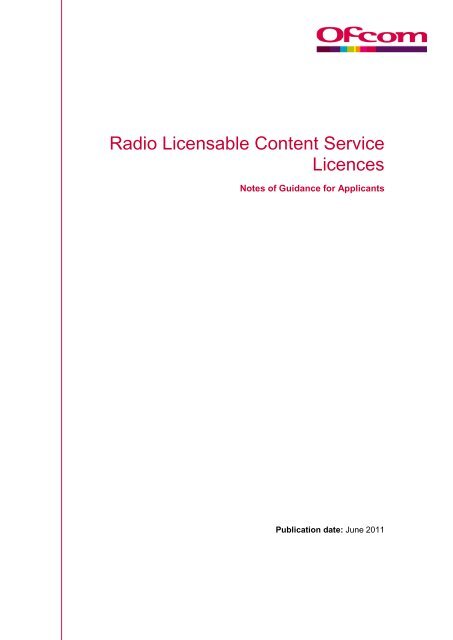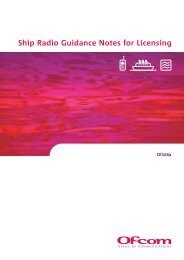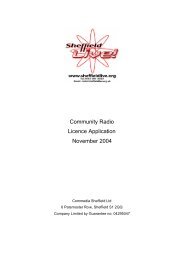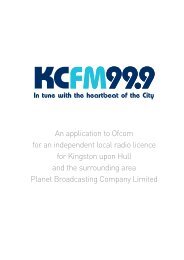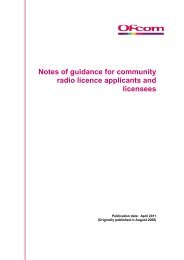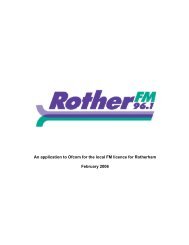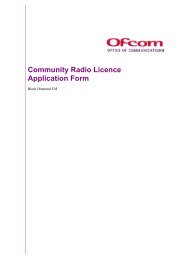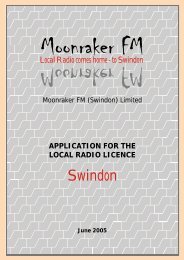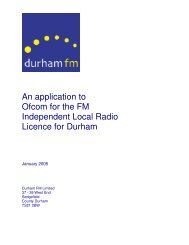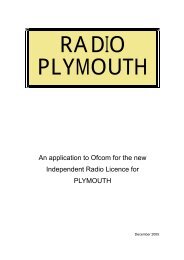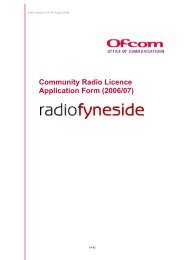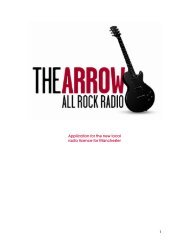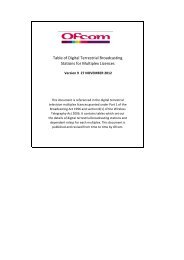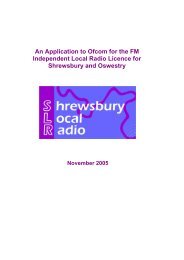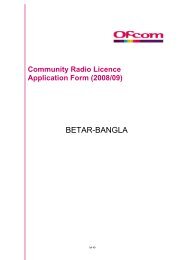Radio Licensable Content Service (RLCS) - Ofcom Licensing
Radio Licensable Content Service (RLCS) - Ofcom Licensing
Radio Licensable Content Service (RLCS) - Ofcom Licensing
You also want an ePaper? Increase the reach of your titles
YUMPU automatically turns print PDFs into web optimized ePapers that Google loves.
<strong>Radio</strong> <strong>Licensable</strong> <strong>Content</strong> <strong>Service</strong><br />
Licences<br />
Notes of Guidance for Applicants<br />
Publication date: June 2011
<strong>Content</strong>s<br />
Section Page<br />
1 <strong>Radio</strong> <strong>Licensable</strong> <strong>Content</strong> <strong>Service</strong>s 2<br />
General Matters 2<br />
Criteria and timetable for <strong>Licensing</strong> 3<br />
The Application Process 3<br />
Licence Obligations 4<br />
Variation of Licences 5<br />
Additional Requirements 5<br />
Duration 5<br />
Fees 5<br />
Annex A Guidance on the Involvement of Religious Bodies 6<br />
1
Section 1<br />
<strong>Radio</strong> <strong>Licensable</strong> <strong>Content</strong> <strong>Service</strong>s<br />
1. The meaning of radio licensable content service is set out in sections 245 to 248<br />
of the Communications Act 2003. <strong>Radio</strong> licensable content service (“<strong>RLCS</strong>”)<br />
licences replace the separate categories of satellite service licences and<br />
licensable sound programme service licences (i.e. cable) which were<br />
established under the Broadcasting Act 1990.<br />
2. A radio licensable content service is a service provided in digital or analogue<br />
form broadcast from a satellite or distributed using an electronic<br />
communications network that is to be made available for reception by members<br />
of the public and consists of sound programmes.<br />
3. In broad terms, radio licensable content services do not include internet services<br />
or two-way services. Further, they do not include a service which is distributed<br />
by means of an electronic communications network only to persons who are<br />
within a single set of premises, and not connected to an electronic<br />
communications network any part of which is outside those premises. Neither<br />
do they include services which are provided only for persons who have a<br />
business interest in the programmes included in the service or persons who are<br />
all on the business premises of the person receiving the service.<br />
4. <strong>Ofcom</strong>’s statutory function with regard to radio licensable content service<br />
licensing is laid out in section 245 of the Communications Act 2003. To fall<br />
within the scope of this section, an <strong>RLCS</strong> would have to be either:<br />
(a) provided from a place within the UK; or<br />
(b) provided by a person whose principal place of business is in the UK; or<br />
(c) uplinked in the UK and not licensed under the laws of another EEA state.<br />
5. For <strong>Radio</strong> <strong>Licensable</strong> <strong>Content</strong> <strong>Service</strong> Licences, one licence is necessary per<br />
service rather than per company or individual. There is no restriction on the<br />
number of licences which can be held by an individual or company.<br />
General Matters<br />
6. A service will be licensable if it falls within one of the statutory licence definitions<br />
in the Communications Act 2003 (see above). Applicants are responsible for<br />
assessing whether a service requires a licence. They may wish to take their<br />
own professional advice in order to comply with this obligation<br />
7. These notes are for the general guidance of applicants and do not purport to<br />
explain all the relevant provisions of the legislation, or give an exhaustive<br />
account of the licensing requirements and can not be taken as modifying the<br />
effect of the statutes.<br />
8. The appropriate licensee will be the “provider” of the service. The provider is the<br />
person who is in a position to determine what is to be included in the service or<br />
in the words of the Communications Act 2003 the person “with general control<br />
2
over which programmes and other services and facilities are comprised in the<br />
service (whether or not he has control of the content of individual programmes<br />
or of the broadcasting or distribution of the service)”.<br />
9. The licence does not grant any 'right' to broadcast. All commercial<br />
negotiations and arrangements are the sole responsibility of the licensee.<br />
Criteria and timetable for <strong>Licensing</strong><br />
10. Licence applications are considered as and when they are received. To be able<br />
fully to consider an application, <strong>Ofcom</strong> may need to request further information<br />
or clarification from the applicant. Should <strong>Ofcom</strong> request such further<br />
information or clarification from an applicant and no response is received by<br />
<strong>Ofcom</strong> within one month of such request then an application will be deemed to<br />
have lapsed.<br />
As a guideline, our aim is to issue a licence within 4 weeks of receipt of the<br />
application. This assumes that full and accurate information has been provided<br />
by an applicant in the application form and accompanying documentation.<br />
Applicants are nevertheless advised to ensure that they have obtained their<br />
licences well in advance of their intended launch date. Applicants with religious<br />
objectives are advised to allow approximately 8 weeks for their application to be<br />
considered by <strong>Ofcom</strong> in the light of the religious ownership guidelines which can<br />
be found in Annex A.<br />
11. Applicants should be aware that <strong>Ofcom</strong> is under a duty to ensure that it does<br />
not license bodies with objects which are of a wholly or mainly political nature,<br />
and will consider applications carefully in the light of its duties. Applications<br />
where questions arise in relation to this issue may take longer than the usual<br />
four weeks.<br />
The Application Process<br />
12. <strong>Ofcom</strong> will need to be satisfied that an applicant complies with the statutory<br />
provisions on ownership as laid out in Schedule 2 of the Broadcasting Act 1990<br />
(as amended by the Broadcasting Act 1996) and the Communications Act 2003.<br />
Briefly stated, these are:<br />
13. Disqualified Persons:<br />
i) Local authorities may not hold licences except in circumstances<br />
defined in part 2 'of' schedule 2 to the Broadcasting Act 1990 (see<br />
also section 349 of the Communications Act 2003), and are limited to<br />
a 5% participation in any company which does.<br />
ii) Political bodies, their associates and officers may not hold licences<br />
and are limited to a 5% participation in any company which does.<br />
iii) Publicly-funded bodies may not hold licences and are limited to a 5%<br />
participation in any company which does.<br />
3
iv) The BBC and the Welsh Authority are disqualified from holding<br />
<strong>Ofcom</strong> licences. However, companies which the BBC controls are<br />
not disqualified.<br />
v) Advertising agencies and their associates (including directors) may<br />
not hold licences and are limited to a 5% participation in any<br />
company which does.<br />
vi) Anyone who has been convicted of any offence under the Wireless<br />
Telegraphy Act 1949 or Marine & c., Broadcasting (Offences) Act<br />
1967, or of an offence under section 97 of the Broadcasting Act 1990<br />
or section 145 of the Broadcasting Act 1996 is disqualified from<br />
holding an <strong>Ofcom</strong> licence.<br />
vii) Religious bodies, their associates and officers may only hold<br />
licences if they have prior approval from <strong>Ofcom</strong>, for guidance please<br />
refer to Annex A.<br />
14. In addition to the categories of disqualified persons listed above, <strong>Ofcom</strong> will not<br />
grant a licence unless it is satisfied that the applicant is “fit and proper” to hold it.<br />
15. A licensee may be disqualified if, in the opinion of <strong>Ofcom</strong>, a local authority or<br />
political body is exercising undue influence over the licensee.<br />
16. Failure by a licensee to comply with statutory ownership provisions will<br />
constitute a breach of the licence and, if not rectified, may result in revocation in<br />
accordance with accordance with the terms of the licence.<br />
17. Full details of the ownership of any applicant company are requested on the<br />
application form. A declaration confirming that the applicant does not fall into<br />
any of the above disqualified categories must be signed and dated.<br />
Licence Obligations<br />
18. The radio licensable content service licence will require that the sound service it<br />
covers complies with the <strong>Ofcom</strong> broadcasting Code<br />
http://www.ofcom.org.uk/tv/ifi/codes/bcode which represents <strong>Ofcom</strong>’s current<br />
policy.<br />
19. Potential applicants should be aware that in order to assist <strong>Ofcom</strong> in its<br />
functions, licensees are required to retain recordings of all programmes and<br />
ancillary material for a period of 42 days and produce them to <strong>Ofcom</strong> on<br />
request.<br />
20. Sanctions may be imposed if licence conditions (including Code rules) are<br />
breached. These include a warning, a requirement to broadcast a statement of<br />
findings, a financial penalty, or the suspension or revocation of a licence.<br />
Variation of Licences<br />
21. <strong>Ofcom</strong> has the power to vary licences, but only after the licensee has been<br />
given a reasonable opportunity to make representations about any proposed<br />
variation.<br />
4
Additional Requirements<br />
22. Details of the programme service to be provided by the <strong>Radio</strong> <strong>Licensable</strong><br />
<strong>Content</strong> <strong>Service</strong> Licensee will be set out in the Annex to the licence. If there is<br />
any change to the service provided under the terms of the licence, <strong>Ofcom</strong> will<br />
require notification.<br />
23. Applications must be accompanied by a letter of corroboration from the<br />
satellite/cable operator. The letter must evidence that an agreement is in place<br />
(subject to contract / licence being granted etc) to carry the service for which the<br />
<strong>RLCS</strong> application is being made. The <strong>RLCS</strong> application will not be processed<br />
until this letter is received.<br />
24. It is the responsibility of a radio licensable content service licensee to enter into<br />
agreements with the appropriate copyright licensing bodies before commencing<br />
broadcasting.<br />
Duration<br />
25. <strong>Radio</strong> <strong>Licensable</strong> <strong>Content</strong> <strong>Service</strong> Licences are for an indefinite period as long<br />
as the annual fees are paid, but may be surrendered by the licensee.<br />
Fees<br />
26. For <strong>Radio</strong> <strong>Licensable</strong> <strong>Content</strong> <strong>Service</strong> Licences the application must be<br />
accompanied by a non-refundable application fee of £250. There is an annual<br />
licence fee of £575<br />
Annual licence fees are payable in advance and the first payment must<br />
accompany the application document.<br />
5
Annex A<br />
Guidance on the Involvement of<br />
Religious Bodies<br />
Guidance for religious bodies making applications for a broadcasting licence under<br />
paragraph 2 of Part II of Schedule 2 to the Broadcasting Act 1990<br />
1. This guidance applies to any applicant for a broadcasting licence:<br />
a) whose objects are wholly or mainly of a religious nature;<br />
b) that is controlled by a body or bodies whose objects are wholly or<br />
mainly of a religious nature;<br />
c) that controls a body whose objects are wholly or mainly of a religious<br />
nature;<br />
d) that is an associate of a body corporate whose objects are wholly or<br />
mainly of a religious nature;<br />
e) that is a body corporate in which a body falling within paragraph 1(a)<br />
to (d)holds more than a 5 per cent interest;<br />
f) who an individual who is an officer of a body falling with paragraph<br />
1(a);or<br />
g) that is a body which is controlled by one or more individuals falling<br />
within paragraph 1(f).<br />
2. <strong>Ofcom</strong> will consider applications from bodies described in paragraph 1 for the<br />
following broadcasting licences in accordance with the guidance set out in<br />
this note:<br />
a) a restricted (television)service licence within the meaning of Part 1 of<br />
the Broadcasting Act 1990;<br />
b) a digital (television)programme licence within the meaning of section<br />
18 of the Broadcasting Act 1996 for the purposes of Part 1 of that Act;<br />
c) a digital (television)additional services licence within the meaning of<br />
section 25 of the Broadcasting Act 1996 for the purposes of Part 1 of<br />
that Act;<br />
d) a television licensable content services licence within the meaning of<br />
Part 3 of the Communications Act 2003;<br />
e) a local analogue sound programme service within the meaning of<br />
section 245 of the Communications Act 2003 (including community<br />
radio service licences, as defined in the Community <strong>Radio</strong> Order<br />
2004);<br />
6
f) a restricted (radio)service licence within the meaning of section 245 of<br />
the Communications Act 2003;<br />
g) a radio licensable content service within the meaning of section 247 of<br />
the Communications Act 2003;<br />
h) a local or national digital sound programme service licence within the<br />
meaning of section 60 of the Broadcasting Act 1996 for the purposes<br />
of Part 2 of that Act; and<br />
i) a digital additional sound services licence within the meaning of<br />
section 64 of the Broadcasting Act 1996 for the purposes of Part 2 of<br />
that Act.<br />
3. Pursuant to paragraph 2A of Part II of Schedule 2 to the Broadcasting Act<br />
1990 and paragraphs 9 and 10 of Schedule 1 of the Human Rights Act<br />
1998,<strong>Ofcom</strong> will consider the appropriateness of religious bodies to hold BA<br />
licences provided they do not:<br />
a) practice or advocate illegal behaviour;<br />
b) practice or advocate behaviour which is injurious to the health or<br />
morals of participants or others;<br />
c) practice or advocate behaviour which infringes the rights and<br />
freedoms of participants or others;<br />
d) pose a threat to public safety;<br />
e) pose a threat to national security or territorial integrity; or<br />
f) threaten the authority and impartiality of the judiciary.<br />
4. <strong>Ofcom</strong> will also require to be satisfied that the applicant meets the<br />
requirements placed upon all prospective licensees, including the<br />
requirements:<br />
a) to be a fit and proper person (section 3(3)of the Broadcasting Act<br />
1990).This requirement will also apply to the directors and chief<br />
officers of any corporate body intended to hold the licence, and of any<br />
person or associated corporate body of that the applicant deemed to<br />
have control of the applicant for the purposes of section 357 of the<br />
Communications Act 2003;<br />
b) the ability and the intention to comply with other licence conditions<br />
placed upon broadcasters, including compliance with:<br />
i) <strong>Ofcom</strong> ’s standards objectives (section 319 of the<br />
Communications Act 2003);<br />
ii) fairness and privacy requirements (section 107 of the<br />
Broadcasting Act 1996);<br />
iii) complaints handling procedures (section 328 of the<br />
Communications Act 2003);<br />
7
iv) obligations to retain and produce recordings (section 334 of the<br />
Communications Act 2003);<br />
v) relevant international obligations (section 335 of the<br />
Communications Act 2003);<br />
vi) equal opportunities and training requirements (section 337 of<br />
the Communications Act 2003); and<br />
c) to comply with the media ownership rules applying from time to time in<br />
accordance with Schedule 14 of the Communications Act 2003.<br />
5. <strong>Ofcom</strong> may seek evidence from the applicant and advice from other parties<br />
on the matters referred to in paragraphs 2 and 3 above before making a<br />
determination.<br />
6. If, having made a determination under paragraph 2A of Part II of Schedule 2<br />
of the Broadcasting Act 1990 that a body defined in paragraph 1 may ho d<br />
one or more of the licences described in paragraph 2,<strong>Ofcom</strong> are satisfied that<br />
a licensee:<br />
a) is in breach of the restrictions set out in paragraph 2;<br />
b) is no longer a fit and proper person;<br />
c) is in breach of the media ownership rules referred to in paragraph<br />
3(c);<br />
d) has committed a breach of its licence conditions that is serious<br />
enough to warrant licence revocation, it may revoke that determination<br />
In that event, the Licensee shall cease to be eligible to hold the<br />
licence and its licence will be revoked.<br />
8


